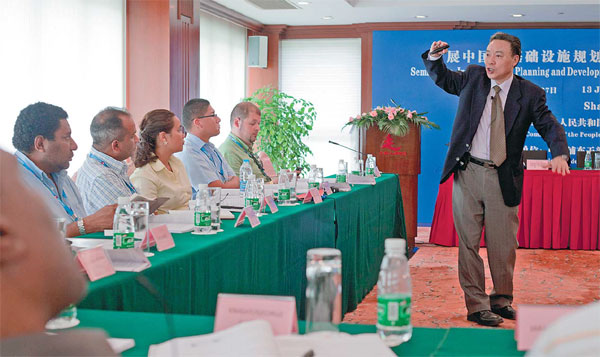A lesson in sharing experiences
Updated: 2012-06-26 04:24
By Tang Yue (China Daily)
|
||||||||
|
 |
|
Jiang Haishan, vice-president of the China Executive Leadership Academy Pudong in Shanghai, delivers a lecture to foreign officials on June 14. [Photos by Gao Erqiang / China Daily] |
"The basic part is very popular among foreign officials," said Jiang Haishan, who delivers the lecture State Structure and the Decision-Making System in China and is also a vice-president of the academy. He noted that a lot of the participants have limited knowledge about China, and what they do know usually revolves around the country's rapid economic development during the past three decades.
The seminar on infrastructure served as an example. For Oulay Phadouandeth of the Ministry of Public Works and Transport in Laos, the Chinese political system is familiar because "Laos is pretty much the same," he said.
More than half of the participants were visiting China for the first time, and they found the lectures fresh and informative. "I think it is very interesting," said Zulaikha Bai Alimohamed, divisional manager of the Mauritian Road Development Authority. "It is something new to me and it's helpful to learn about the decision-making process because it is related to city planning and infrastructure development."
Fitzroy Williams, chief technical director of the Jamaican Ministry of Transport, Works and Housing, agreed: "My job is technical. However, the really fascinating thing about China is that economic and other developments in China fit within a framework," he said.
"It is the theoretical framework that drives the practice and application of the different experiments and developments. It is clear that for China the political system serves as the engine or the fuel that makes everything happen. It is necessary to set that background for us."
No taboos
A vast number of topics, ranging from China's political reform to religious beliefs, the protection of intellectual property rights to the family planning policy, were popular during the discussions, Jiang said.
Questions such as, "Is China an autocratic state?" and "Is China still a socialist country?" were also asked. "There are really no taboos in the discussions. We don't dodge any issue, be it human rights, democracy or the management of new media," said Jiang.
He noted that while there is only one lecturer for each topic, two or three colleagues are always on hand to take questions from the participants. "We provide them with our view on the topic, but we don't expect everyone to agree with us. But they gain greater understanding after the discussion, more or less," said Jiang.
The lecturers also take the initiative to talk about challenges, such as corruption and the gap between rich and poor.
Whether or not they accepted the validity of any given theory, the foreign officials appreciated the open attitude. "I'm satisfied with most of their answers, except the one about Facebook (which is not accessible in China)," said Tomica Paovic, an advisor to the deputy prime minister of Montenegro.

 Relief reaches isolated village
Relief reaches isolated village
 Rainfall poses new threats to quake-hit region
Rainfall poses new threats to quake-hit region
 Funerals begin for Boston bombing victims
Funerals begin for Boston bombing victims
 Quake takeaway from China's Air Force
Quake takeaway from China's Air Force
 Obama celebrates young inventors at science fair
Obama celebrates young inventors at science fair
 Earth Day marked around the world
Earth Day marked around the world
 Volunteer team helping students find sense of normalcy
Volunteer team helping students find sense of normalcy
 Ethnic groups quick to join rescue efforts
Ethnic groups quick to join rescue efforts
Most Viewed
Editor's Picks

|

|

|

|

|

|
Today's Top News
Health new priority for quake zone
Xi meets US top military officer
Japan's boats driven out of Diaoyu
China mulls online shopping legislation
Bird flu death toll rises to 22
Putin appoints new ambassador to China
Japanese ships blocked from Diaoyu Islands
Inspired by Guan, more Chinese pick up golf
US Weekly

|

|






